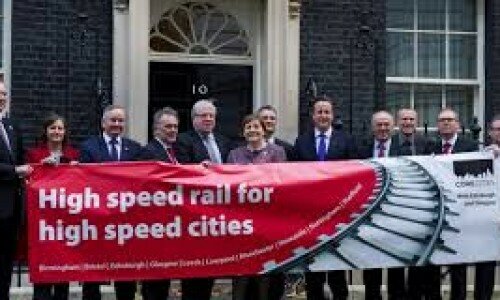
Labour council leaders warn Corbyn to ‘keep off our territory’
Jeremy Corbyn’s victory has not impressed Labour bosses of Britain’s biggest councils who fear the hard-left’s centralising instincts will put paid to the lucrative regional devolution deals they are negotiating with the Treasury in the unlikely event of the party’s new leader winning the 2020 General Election, writes Paul Dale.
The Core Cities summit, a gathering of Britain’s largest councils, was held last Friday as the Labour leadership contest reached its final stages. By then it was clear Jeremy Corbyn would win, and the town hall leaders lost little time in sending out a “keep off our territory” message.
Nick Forbes, the Labour leader of Newcastle city council, put it bluntly:
As Labour leaders, we will create jobs, homes and growth, not design placards and protest from the sidelines.
The comparison Forbes sought to draw between the Core Cities pragmatic approach to partnership building, which extends to working with a Tory government to deliver local growth deals, and the poster-waving Corbynista protest movement could hardly have been clearer.
During his leadership election campaign Mr Corbyn sent out conflicting and confusing messages about his economic policy, in particular his attitude to the regional ‘powerhouse’ agreements being negotiated by Birmingham and other city regions, as well as the future of high speed rail and local enterprise partnerships.
A Vision for Britain 2020 document launched in August was heavily trailed.
Mr Corbyn, according to his campaign team, was to” raise a question over the Government’s plans to build the HS2 high-speed railway line to the north, on the grounds that it would drain other lines of investment and turn northern cities into dormitories for London businesses”.
His commitment to renationalise the railways “to meet social, economic and environmental goals” also raised doubts about how high speed rail backed partly by private sector investment would fit into a publicly owned rail network.
The possibility of Labour while still in opposition switching sides and opposing the HS2 hybrid bill’s progress through parliament could yet scupper the project, if the minor parties and enough rebel Tory MPs joined a rebellion.
In the event, references to HS2 were removed from the document and a new clause inserted stating that a Corbyn-led Labour party would “stimulate the economy by increasing investment in new high speed rail, creating jobs and connecting more towns and cities”.
The reappointment yesterday by Mr Corbyn of Lilian Greenwood as shadow transport secretary suggests that Labour remains committed to HS2, for the time being at least.
A year ago on a visit to Birmingham Ms Greenwood praised the city council for the way it was embracing the arrival of high speed rail and the Curzon masterplan detailing land use around the HS2 city centre station which would create more than 14,000 jobs, 600,000 sq metres of new employment floorspace,2,000 new homes, and boost the economy by £1.3 billion a year.
HS2 itself will boost the West Midlands economy by £4.1 billion each year and create more than 51,000 new jobs while providing extra capacity and better connections to London and the north, according to the integrated transport authority.
Mr Corbyn’s dislike of local enterprise partnerships is also threatening to create difficulties with Labour council leaders. Devolution deals worth billions of pounds are being negotiated with the Government and are highly dependent on the involvement of LEPs.
The shadow West Midlands Combined Authority and three local enterprise partnerships are close to closing a deal with the Treasury which could be worth £8 billion.
In his 2020 Vision document Mr Corbyn proposals to “re-industrialise” northern regions of England and overhaul Local Economic Partnerships in favour of new “investment institutions” which would, among other things, seek to channel funding to boost the rollout of superfast broadband.
The document criticises Local Enterprise Partnerships as being too Treasury-led and unable to rebalance the economy because they “lack the scope, capacity and scale to tackle these problems free from central government diktat”.
Sir Richard Leese, the Labour leader of Manchester council, responded by saying Mr Corbyn “completely ignores what Labour in the north is doing.”
Similar Articles
Hezza: Give Metro Mayors greater powers to deliver housing, skills and jobs 0
Britain’s metro mayors should be given greater powers over housing, schools and jobs to truly
Who can beat the Street?
You could be forgiven for not realising we are in the foothills of the very
Mayoral Mayhem? A challenging year begins…
The Board of the West Midlands Combined Authority (WMCA) meets this morning for the first
Council: Panel stands down, but recommends another one pop up
The Panel set up to oversee improvements to Birmingham city council has disbanded itself and
Brexit Watch: The List
We are living though extraordinary political times. The only thing to do in such circumstances










